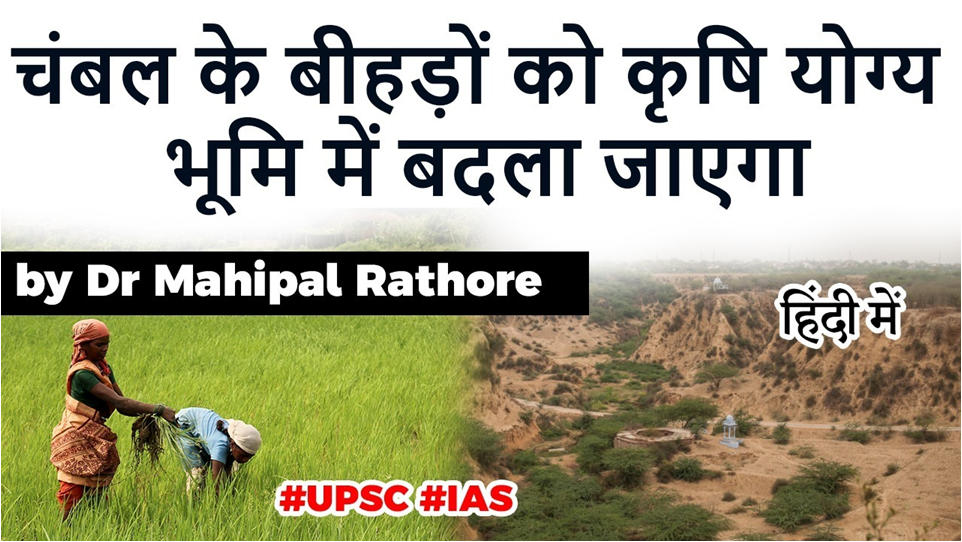Table of Contents

- The Centre has decided to convert large area of ravines in Gwalior-Chambal belt of Madhya Pradesh into arable land.
- A preliminary report for the same will be prepared in a month.
- The project will be taken up in collaboration with the World Bank.



- The Chambal ravines are known for infertile terrain, water scarcity and frequent droughts. Farming was almost impossible
- Ravines are a type of fluvial erosional feature and are formed as a result of constant vertical erosion by streams and rivers flowing over semi-arid and arid regions.
- Badland topography is a major feature of the Chambal valley is characterized by an undulating floodplain, gullies and ravines.
- Badlands develop in arid to semiarid areas where the bedrock is poorly cemented and rainfall is generally heavy and intermittent.
- The dry, granular surface material and light vegetation are swept from the slopes during showers, leaving the gullies bare.
What needs to be done?
- The area has to be first levelled – flatten the ravines using machinery.
- The soil, which is prone to erosion, has to be strengthened – bunding.
Earlier plan
- In 2015, the Madhya Pradesh government envisaged the conversion of the entire ravine area of 68,833 hectares falling in the three districts of Morena, Sheopur and Bhind into farm land.
- For this, it had sought Rs 900 crore from the Central government.
- The total cost of the proposed project was estimated at Rs 1,100 crore, with the state government and the beneficiaries (farmers to whom the reclaimed land will be allotted) sharing the remaining burden.

Benefits of making beehad arable
- More than 3 lakh hectares of rugged land is not cultivable in Chambal region
- If this area is improved, then this will help in the integrated development of the Bihad area in Gwalior-Chambal region
- Improving agricultural development and environment
- Will also create employment opportunities .
- Lead to substantive development of the region (Along with Chambal Expressway)
An uphill task
- Schemes since 1970s to tame the ravines have failed.
- Aerial seeding in 1980s failed
- Transfer of land to farmers- contentious.
- Levelling should not be attempted in those areas where slopes are steep or else it would disturb the ecological balance.
- Environment impact – The Chambal river system is home to several kinds of fish, alligators and crocodiles
Some Recent World bank Assisted projects
- World Bank has approved loan of Rs 3,700 crore under ‘Strengthening Teaching-Learning and Results for States Program (STARS)’project to improve the quality and governance of school education across six states (Himachal Pradesh, Kerala, Madhya Pradesh, Maharashtra, Odisha, and Rajasthan)
- The Government of India and West Bengal Government have inked two loan agreements with Asian Infrastructure Investment Bank(AIIB) and World Bank (WB) for the “West Bengal Major Irrigation and Flood Management Project”.

Latest Burning Issues | Free PDF






















 WhatsApp
WhatsApp